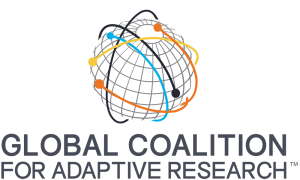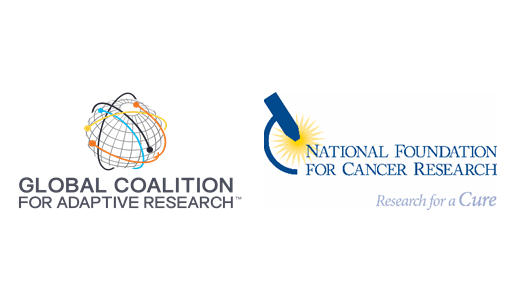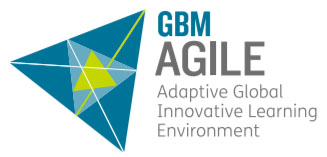Now Enrolling Patients!
The first treatment arm of the GBM AGILE adaptive clinical trial is now open and enrolling patients. Learn more about this trial here.
What is GBM?
Glioblastoma (GBM) is the deadliest type of brain cancer, accounting for 45% of all malignant brain tumors. In the United States alone, over 12,000 new cases per year are detected. The disease has long been universally fatal and without cure, with a median survival rate after diagnosis of one to two years and killing 95% of patients within five years.
GBM is the most common and the deadliest type of brain cancer, accounting for 45% of all malignant brain tumors.
GBM kills 95% of patients within five years of diagnosis, with more than half dying within the first 15 months after diagnosis.
Each year, more than 12,000 people living in the U.S. will receive a diagnosis of GBM.
240,000 people worldwide are diagnosed with GBM annually.
The disease is extremely complex, necessitating exhaustive research efforts to better understand, combat and defeat it. Like many cancers, GBM’s cause remains uncertain. Known inherited predispositions to the disease are extremely rare, but its incidence is more common among males, people older than 50 and those of Caucasian or Asian ethnicity. This devastating brain cancer most often first arises in the frontal or temporal lobe and spreads into other parts of the brain very quickly. Surgery, radiation or chemotherapy offer some hope in delaying disease recurrence or progression but not in eliminating it.
- Surgery: Complete surgical removal of the cancer is extremely difficult because of finger-like tentacles that extend into surrounding normal brain tissue.
- Radiation and Chemotherapy: Radiation and chemotherapy treatments, usually in tandem, can extend patient life and temporarily improve quality, but the tumor tends to increasingly resist the standard-of-care drug, and neither it nor any other yet represents a cure.
- Precision Medicine: GBM is made up of a wide mix of different cell types that often differ from patient to patient, and, post-treatment, when tumors recur or grow back, the molecular profile changes dramatically—challenging precision medicine efforts.
The Challenge: The Standard Clinical Trial System is Ineffective for GBM
The development of new cancer treatments is accomplished through a procedure known as clinical trials, wherein experimental medical therapies are tested for safety, efficacy and improvement over the current standard of care or a placebo before being approved by proper regulatory authorities.
Unfortunately, the standard clinical trial model threatens the ability to deliver new and improved treatments to patients facing a diagnosis of glioblastoma. More than 90% of GBM patients will have died in the time it takes to test a single drug. Efforts to bring any one particular new product to market may last more than eight years, cost hundreds of millions of dollars per treatment tested, require an enormous amount of devotion and leave us no closer to a cure than when the process all started.
The Solution:
GBM AGILE—A Revolutionary New Adaptive Trial Platform
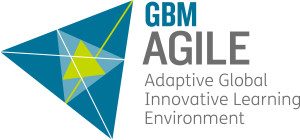
Not a single laboratory discovery, scientific breakthrough, drug candidate nor even specific clinical trial study thereof. Rather, GBM AGILE represents a novel clinical trial system for evaluating and potentially approving multiple treatments for glioblastoma.
As the acronym so aptly alludes, the GBM AGILE system is designed to offer greater responsiveness, flexibility, speed, rationality and incentives than does the standard clinical trial model. All without sacrificing the three critical criteria that all clinical trials exist to ensure: safety, efficacy and improvement.
What are the advantages of adaptive over standard GBM clinical trials?
Responsiveness
Analyze results in real time; learn what works and apply to future enrollees; scale up administration of those experimental treatments showing the most to-date progress, and down those showing the least; account for genetic profiles.
Flexibility
Study designs, otherwise locked in at the start and nontolerant to modification, can be adjusted if inefficiencies are ascertained.
Speed
New experimental treatments can be initiated quickly, which is especially important for fast acting diseases with high mortality rates; years of data collection are not required before determining candidates which seem to offer benefit.
Rationality
Multiple experimental treatments and combinations thereof are studied in parallel; ineffective ones can be shut down early, saving developers and sponsors millions of dollars and potentially leaving patients with time to try more promising alternatives.
Incentives for Participation
Objective, “survival of the fittest” guidelines of the adaptive clinical trial model agreed to up front by treatment developers and sponsors; combinations of treatments too will be studied, minimizing the risk of premature termination of studies of any single drug candidate.

As shown, GBM AGILE, as an adaptive clinical trial, differs significantly from the standard model. And the phrase “innovative learning environment” captures the essence of real-time feedback-loop principles driving the model. But another of the most distinguishing features of GBM AGILE is its global scope.
Patients:
Standard trials are expensive and require large numbers of participants. Since GBM is an orphan disease (relatively few cases per year), there is a shortage of funding to initiate studies and patient pools are limited. Efficiencies obtained through economies of scale are particularly critical. And the number of subjects available in any given country often is not enough to sustain study efforts. The global nature of GBM AGILE adaptive trials provides the critical mass of patients necessary, accelerating the pace of discovery.
Researchers:
The GBM AGILE coalition represents a dedicated group of world-class—and world-stretching—neurosurgeons, neuro-oncologists, basic and clinical investigators, cancer advocacy and oncology research funding community members.
Collaborators:
U.S., Canadian, Australian, Chinese and European partners are combining their resources and expertise to take action over one of the world’s deadliest diseases. At the initiative’s core are some 150 researchers from more than 40 leading institutions spread across four continents.
This coalition has developed a more “AGILE” approach to defeating GBM, with the goal of enabling faster and more efficient testing of new agents and combination therapies, better identification of predictive and prognostic biomarkers and delivery of more effective treatments to all glioblastoma patients.
The Coalition
Background
The GBM Knowledge Network
The vision to combine otherwise disparate efforts of dozens of the world’s preeminent GBM-battling scientists and institutions into one force began coalescing in 2013, following sessions organized by three scientists: Webster Cavenee, Ph.D., W.K. Alfred Yung, M.D., and Anna Barker, Ph.D. Timing coincided with advances in the field of Bayesian statistics, upon which the adaptive clinical trial model is based, and increasing confidence within the global drug regulatory community in both the field and the model’s validity. Over the course of the next two years, the idea took form, bolstered by U.S. Vice President Joseph Biden, whose high-profile call to action following his son Beau’s spring 2015 death resulting from GBM particularly galvanized the brain cancer community.
At a November 13, 2015, event in Washington, D.C. attended by Vice President Biden, the GBM AGILE program was formally launched. The initiative was overseen for its first two years by the National Biomarker Development Alliance, which developed the initial draft of the GBM AGILE adaptive clinical trial master protocol. In late 2017, GBM AGILE’s sponsorship and management were transferred to the Global Coalition for Adaptive Research (GCAR), where it remains and under whose sponsorship the platform has grown and developed. The GBM AGILE Knowledge Network, comprised originally of nearly 150 scientists and 40 institutions spread across four continents, is maintained by GCAR and continues to provide input and guidance.
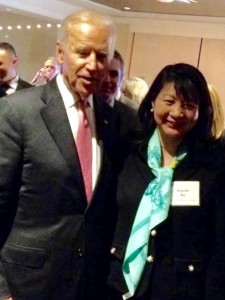
GCAR
The Global Coalition for Adaptive Research is a 501(c)(3) non-profit established in 2017 to speed the discovery and development of cures for patients with deadly diseases. The sponsorship and operationalization of GBM AGILE into a self-sustaining engine of therapeutic and biomarker development for brain cancer patients is its first priority. As the adaptive clinical trial initiative’s sponsor, GCAR conducts GBM AGILE’s overall management of the trial, including regulatory oversight, safety monitoring, clinical management, pipeline building, partnership engagement and financial responsibility.
NFCR’s Role
The National Foundation for Cancer Research, unique to any other U.S.-based research charity, has been from the beginning and will continue to remain, deeply engaged with GCAR in the design, execution and further expansion of GBM AGILE.
- Original strategic partner to GCAR, GBM AGILE’s current sponsor
- Founding member of the National Biomarker Development Alliance, GBM AGILE’s initial sponsor
- Leading financier of GBM AGILE’s efforts to date
- Funder of multiple researchers whose work is pertinent to glioblastoma and whose input could benefit GBM AGILE
- Complementary stakeholders and principals:
- Sujuan Ba, Ph.D., the NFCR President, is a member of the GCAR Board of Directors and a member of the GBM AGILE Knowledge Network’s executive committee
- Michael Wang, Ph.D., the NFCR Chief Strategy Officer, is a member of the GBM AGILE Knowledge Network’s executive committee
- Webster Cavenee, Ph.D., the chairman of NFCR’s Scientific Advisory Board, is one of the GBM AGILE concept’s three original visionaries, GCAR’s Chief Scientific Officer and a member of the GBM AGILE Knowledge Network’s executive committee
- W.K. Alfred Yung, M.D., a former NFCR fellow, is one of the GBM AGILE concept’s three original visionaries, GCAR’s Executive Vice President for International Collaborations and a member of the GBM AGILE Knowledge Network’s executive committee
What’s Next?
The clinical trial design is complete for GBM AGILE. Partnerships with Berry Consultants and Novella Clinical are being pursued. Development and oversight of activities are underway. Collaboration and discussion with key opinion leaders, regulatory and ethics committees, potential patient group representatives, clinical trial experts, drug and biomarker developers and study sites are progressing. The regulatory submission for Investigational New Drug applications with the U.S. Food and Drug Administration is planned, which will pave the way for adaptive clinical trials to be commenced shortly thereafter in the United States, Canada, Australia, China, Europe and elsewhere around the world.
GBM AGILE will create an innovative, adaptive trial model that may be used in the future to accelerate drug trials for many cancers and orphan diseases. The endeavor could be nothing short of revolutionary in terms of changing the way medical research is done. We hope that glioblastoma is just the first cancer to be addressed with this new, rigorous “AGILE” system.



